A historian's quest for the truth about a gruesome mob lynching of two black couples is prompting a U.S. appeals court to consider whether federal judges can order grand jury records unsealed in decades-old cases with historical significance.
The young black sharecroppers were being driven along a rural road in the summer of 1946 when they were stopped by a white mob beside the Apalachee River, just over 50 miles (80 kilometers) east of Atlanta. The mob dragged them out, led them to the riverbank and shot them multiple times. For months the FBI investigated and more than 100 people reportedly testified before a grand jury, but no one was ever indicted in the deaths of Roger and Dorothy Malcom and George and Mae Murray Dorsey at Moore's Ford Bridge in Walton County.
Historian Anthony Pitch wrote a book about the killings — "The Last Lynching: How a Gruesome Mass Murder Rocked a Small Georgia Town" — and continued his research after its 2016 publication. He learned transcripts from the grand jury proceedings, thought to have been destroyed, were stored by the National Archives.
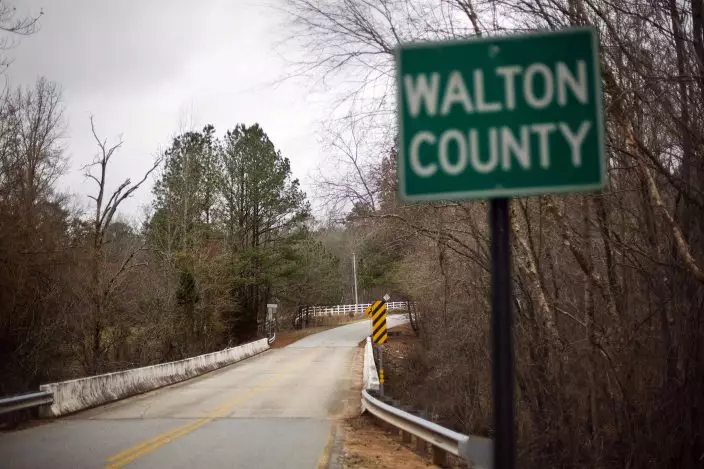
FILE - This Feb. 22, 2018, file photo shows a bridge that spans the Apalachee River at Moore's Ford Road where in 1946 two young black couples were stopped by a white mob who dragged them to the riverbank and shot them multiple times in Monroe, Ga. The lynching is prompting a U.S. court to consider whether federal judges can order grand jury records unsealed in old cases with historical significance. (AP PhotoDavid Goldman, File)
Heeding Pitch's request, a federal judge in 2017 ordered the records unsealed. But the U.S. Department of Justice appealed , arguing grand jury proceedings are secret and should remain sealed.
A three-judge panel of the 11th U.S. Circuit Court of Appeals in February ruled 2-1 to uphold the lower court's order. But the full court voted to rehear the case, and is set to hear oral arguments Tuesday.
Pitch, 80, died just two weeks after the announcement the case would be reheard. His wife, Marion Pitch, has taken her husband's place in the case. Pitch's family also approached Laura Wexler, who wrote another book about the lynching, for help completing his work, and she joined the case.
In 1946, Roger Malcom, 24, was jailed after stabbing and gravely injuring a white man during an argument. A white farmer, Loy Harrison, paid $600 to bail Malcom out on July 25 of that year. Harrison later said he was ambushed by a mob as he drove the four home. Harrison, who is identified in an FBI report as a former Ku Klux Klansman and well-known bootlegger, wasn't hurt. He told authorities he didn't recognize anyone in the mob.
The investigation has been reopened and closed several times since a grand jury failed to indict anyone in December 1946. Students, researchers and activists have all tried to crack the case.
Rules governing grand jury secrecy include exceptions when records may be released. A 1984 ruling in the 11th Circuit, which set binding precedent, says judges may order their disclosure in "exceptional circumstances." The historical significance in this case qualifies, Judge Charles Wilson wrote in the panel's majority opinion. He added that enough time has passed that witnesses, suspects or their immediate family members likely aren't alive to be intimidated, persecuted or arrested.
Concurring, Judge Adalberto Jordan agreed that lower court's ruling should be upheld because of the binding precedent. But Jordan said he would have decided the 1984 case differently. Allowing judges to use inherent authority to go beyond the defined exceptions to grand jury secrecy seems too open-ended, he wrote.
U.S. District Judge James Graham of Ohio, also serving on the panel, dissented. He argued that "judges should not be so bold as to grant themselves the authority to decide that the historical significance exception should exist and what the criteria should be." He also worried people alive today could see their reputations harmed if the records reveal their relative "was a suspect, a witness who equivocated or was uncooperative, a member of the grand jury which refused to indict or a person whose name was identified as a Klan member."
The full 12-judge appeals court is scheduled to hear Tuesday's arguments. Specifically, the judges asked the lawyers whether they should overturn the 1984 precedent. Additionally, they asked, if federal judges can grant disclosures beyond the defined exceptions, is "historical significance" an adequate reason?
Pitch's lawyer, Joseph Bell, argued in a court filing that the 1984 precedent shouldn't be overruled because it acknowledges the need for "exceptional circumstances."
"The historical importance and age of the case, lack of indictment after over seventy years, and fact that other historically significant grand jury records have been released all support the release of the records," Bell wrote
Justice Department lawyer Bradley Hinshelwood countered that Pitch's arguments would allow federal judges to circumvent rules set by Congress and the Supreme Court about the disclosure of grand jury materials.
The rules governing grand jury secrecy provide a "meticulously crafted list of permissible disclosures," Hinshelwood wrote. Even if judges did have the authority to establish other exceptions, it wouldn't extend to historical interest.
The Reporters Committee for Freedom of the Press and 30 news organizations, including The Associated Press, submitted a brief in support of Pitch that was rejected by the court without explanation.
SEOUL, South Korea (AP) — The United States and its allies are discussing options “both inside and outside the U.N. system” to create a new mechanism for monitoring North Korea over its nuclear weapons program, the American ambassador to the United Nations said Wednesday.
Russia last month vetoed a U.N. resolution in a move that effectively abolished monitoring by U.N. experts of Security Council sanctions against North Korea, which prompted Western accusations that Moscow was acting to shield its arms purchases from North Korea to fuel its war in Ukraine.
“I look forward to engaging with both the Republic of Korea and Japan, but like-minded (countries) as well, on trying to develop options both inside the U.N. as well as outside the U.N. The point here is that we cannot allow the work that the panel of experts were doing to lapse,” U.S. Ambassador Linda Thomas-Greenfield told a news conference in Seoul, using the formal name for South Korea.
Thomas-Greenfield didn’t provide specific details about U.S. discussions with allies and other partners, including whether an alternative monitoring regime would more likely be established through the U.N. General Assembly or with an independent entity outside of the U.N.
Thomas-Greenfield met with South Korean Foreign Minister Cho Tae-yul on Monday and they discussed unspecified “next steps to ensure a continuation of independent and accurate reporting” of North Korea’s illicit weapons development activities, according to her office.
Thomas-Greenfield said it was clear that Russia and China, which abstained from voting on the U.N. resolution vetoed by Moscow, will continue to try to block international efforts to maintain monitoring of U.N. sanctions against North Korea. She criticized Russia for violating those sanctions with its alleged arms purchases from North Korea, and China for protecting the North from being held accountable.
Moscow and Beijing have thwarted U.S.-led efforts to tighten U.N. sanctions on North Korea over its ramped-up ballistic missile testing since 2022, underscoring a divide between permanent Security Council members that deepened over Russia’s war on Ukraine.
“I don’t expect that they will cooperate or agree with any efforts that we make to find another path, but that is not going to stop us from finding that path moving forward,” Thomas-Greenfield said.
Thomas-Greenfield also briefly addressed questions about tensions in the Middle East. When asked about the Palestinian Authority's request to have full U.N. membership, she said a U.N resolution in support of that request would not contribute to finding a two-state solution to the Israeli-Palestinian conflict.
“President Biden has said categorically that we support a two-state solution for addressing the situation in the Middle East, where Palestinians will have a state of their own and Israel is secure in their state, and we are working on the ground to get to that place as quickly as possible,” she said.
“We do not see that doing a resolution in the Security Council will necessarily get us to a place where we can find a ... two-state solution moving forward," she added.
Tensions on the Korean Peninsula are at their highest point in years, as North Korean leader Kim Jong Un has accelerated his weapons demonstrations and issued provocative threats of nuclear conflict against rivals.
The United States, South Korea and Japan have responded by expanding their combined military exercises and sharpening their nuclear deterrence strategies built around strategic U.S. assets.
In a telephone conversation on Wednesday, South Korean President Yoon Suk Yeol and Japanese Prime Minister Fumio Kishida agreed to further strengthen three-way cooperation with Washington to counter North Korean threats and other regional challenges amid “deepening uncertainties in the international situation,” Yoon’s office said.
The Security Council imposed sanctions after North Korea’s first nuclear test explosion in 2006 and tightened them over the years in a total of 10 resolutions seeking — so far unsuccessfully — to cut funds and curb its nuclear and missile programs. The last sanctions resolution was adopted by the council in December 2017.
The Security Council established a committee to monitor sanctions, and the mandate for its panel of experts to investigate violations had been renewed for 14 years until last month.
Russia’s U.N. Ambassador Vassily Nebenzia told the Security Council before last month’s vote that Western nations are trying to “strangle” North Korea and that sanctions are losing their “relevance” in preventing the proliferation of nuclear weapons in the North.
In its most recent report circulated last month, the panel of experts said it is investigating 58 suspected North Korean cyberattacks between 2017 and 2023 valued at approximately $3 billion, with the money reportedly being used to help fund its weapons development.
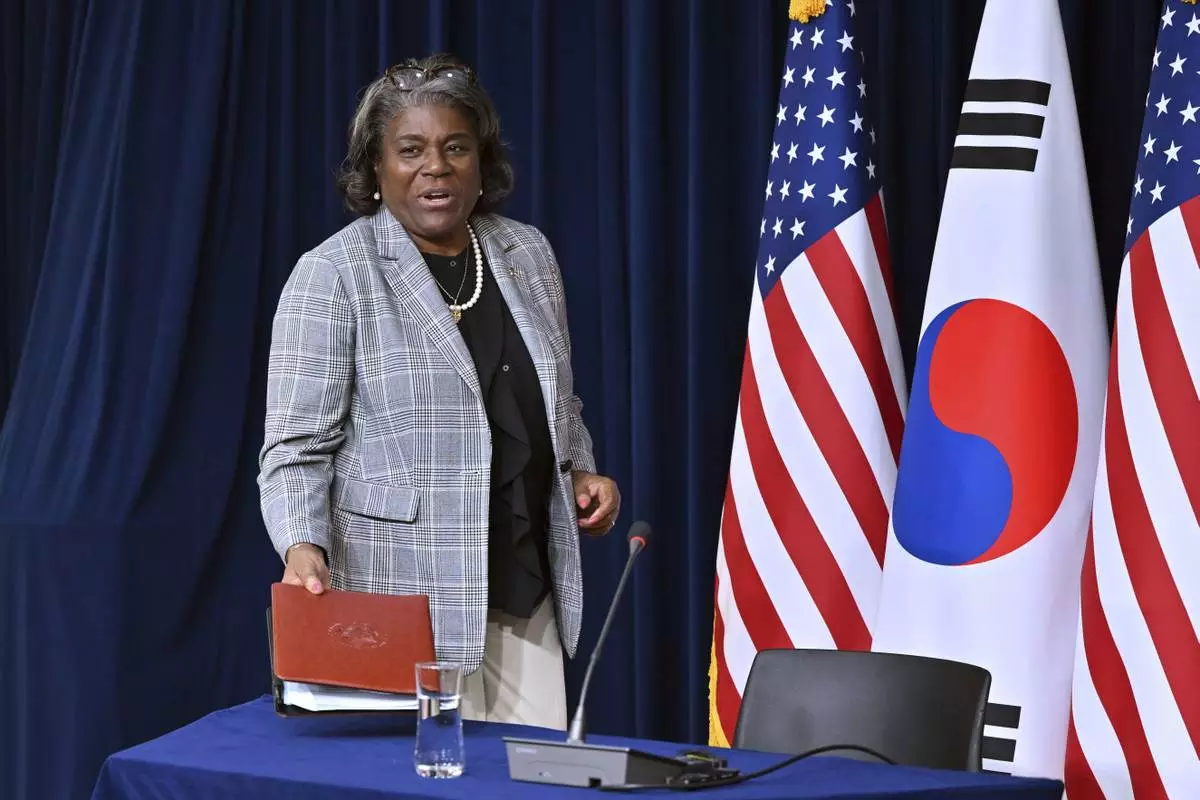
U.S. Ambassador to the United Nations Linda Thomas-Greenfield arrives to attend a press conference at the American Diplomacy House in Seoul Wednesday, April 17, 2024. (Jung Yeon-je/Pool Photo via AP)
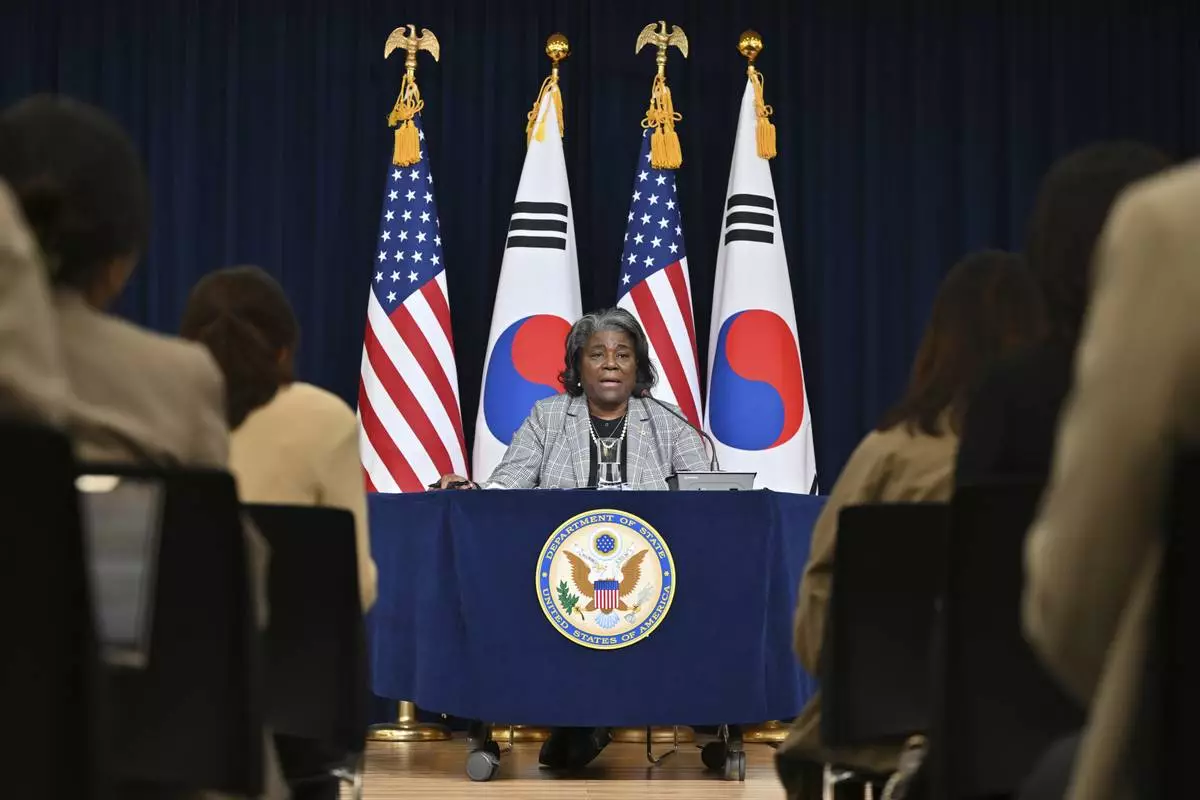
U.S. Ambassador to the United Nations Linda Thomas-Greenfield speaks during a press conference at the American Diplomacy House in Seoul Wednesday, April 17, 2024. (Jung Yeon-je/Pool Photo via AP)
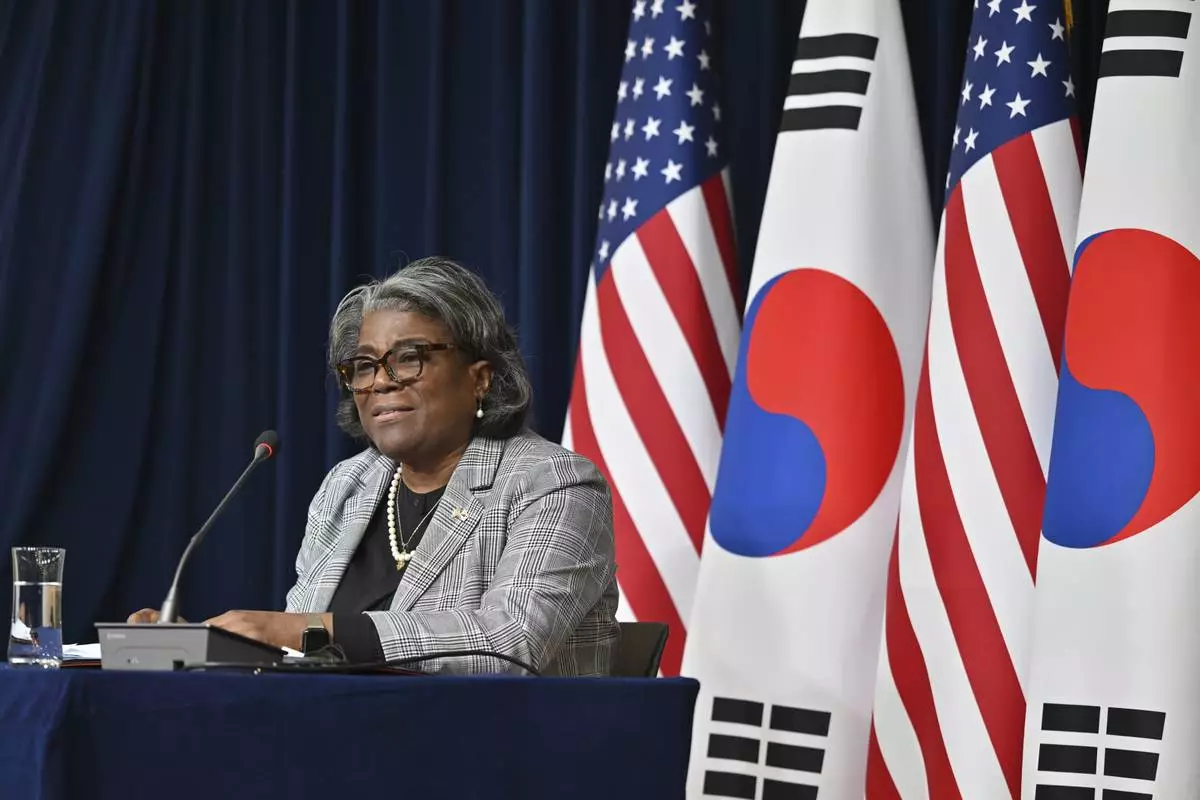
U.S. Ambassador to the United Nations Linda Thomas-Greenfield speaks during a press conference at the American Diplomacy House in Seoul Wednesday, April 17, 2024. (Jung Yeon-je/Pool Photo via AP)
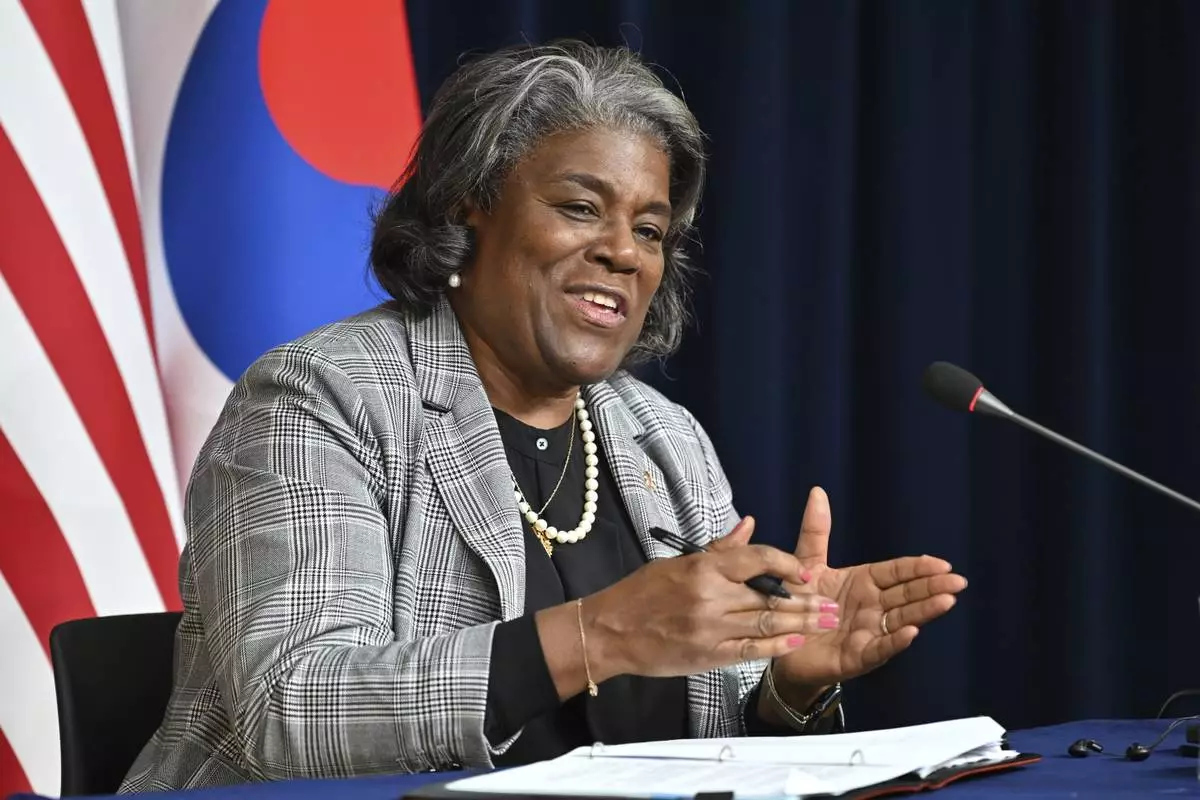
U.S. Ambassador to the United Nations Linda Thomas-Greenfield speaks during a press conference at the American Diplomacy House in Seoul Wednesday, April 17, 2024. (Jung Yeon-je/Pool Photo via AP)
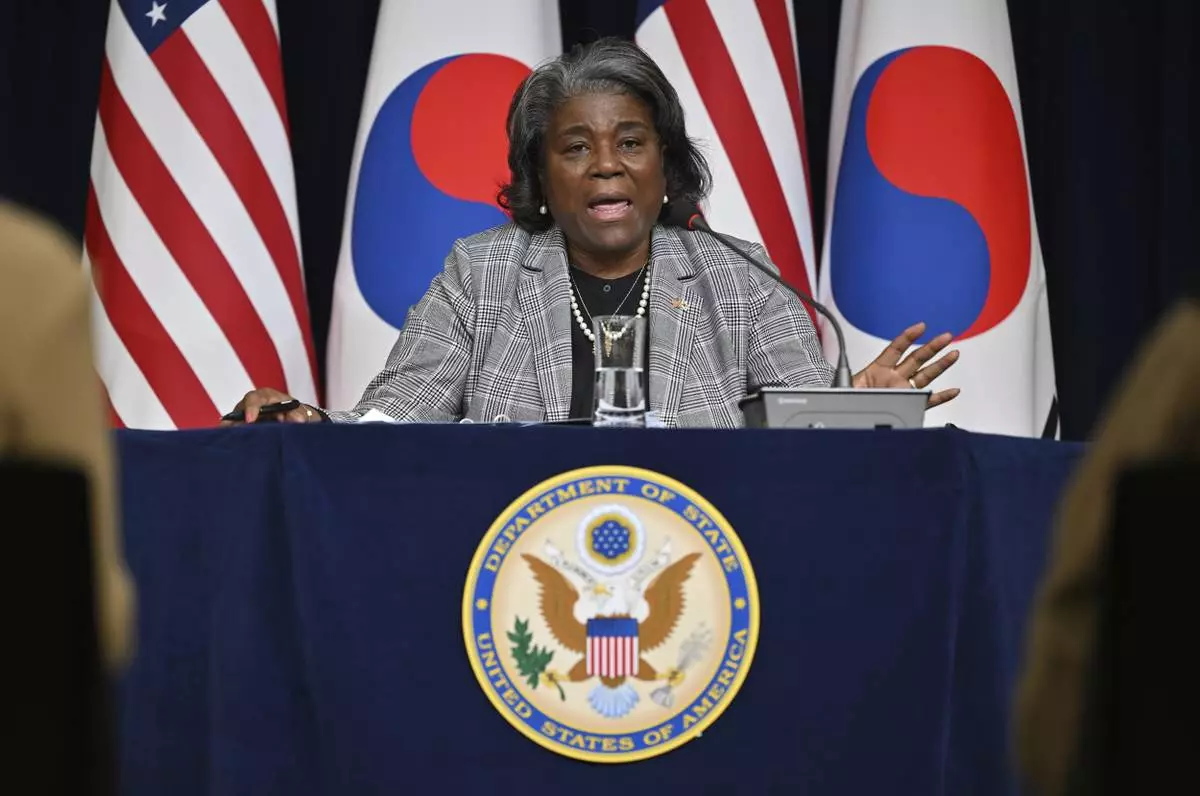
U.S. Ambassador to the United Nations Linda Thomas-Greenfield speaks during a press conference at the American Diplomacy House in Seoul Wednesday, April 17, 2024. (Jung Yeon-je/Pool Photo via AP)
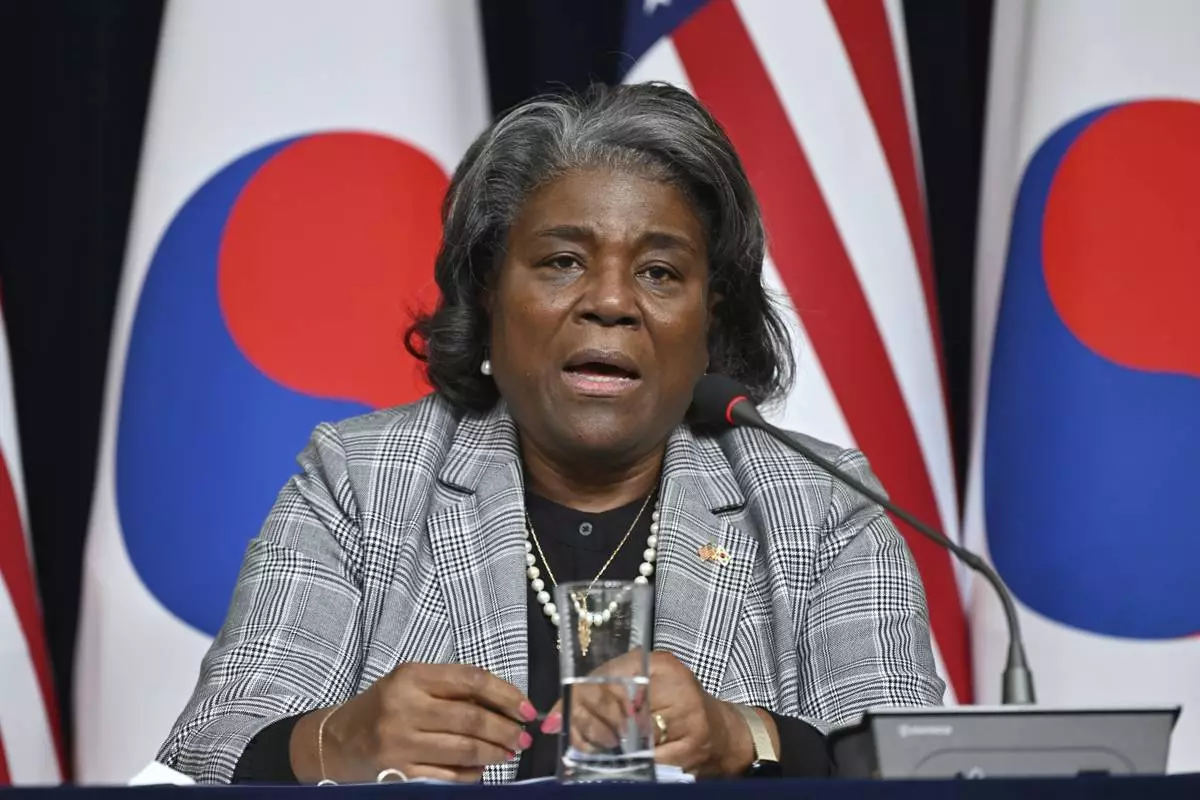
U.S. Ambassador to the United Nations Linda Thomas-Greenfield speaks during a press conference at the American Diplomacy House in Seoul Wednesday, April 17, 2024. (Jung Yeon-je/Pool Photo via AP)
















